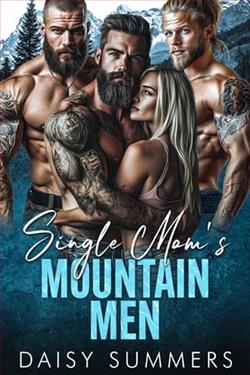Page 22 of Scarlet Thorns
“Yes.” The word comes out sharply as pain radiates from the spot he’s touching.
“And here?” Left side now, same result.
He sits back, running a hand over his salt-and-pepper hair. “Darling, I need you to see my team for some tests. A full pelvic ultrasound, blood work, possibly an MRI depending on what we find.”
The word “tests” makes me go tense. “You think it’s something serious?”
“I think it’s something that needs proper investigation.” His voice is carefully measured, neither dismissive nor alarmist. “Your symptoms suggest several possibilities, but I won’t speculate until we have data.”
For the first time in weeks, I feel a surge of relief. It feels good not to be dismissed, not minimized, not told to take some ibuprofen and deal with it.
“Thank you,” I whisper, surprised by the emotion clogging my throat. “I was starting to think maybe I was being dramatic.”
Dad’s expression darkens. “Who told you that?”
The question is sharp enough to make me look up. “No one directly. Just… Stanley wasn’t very understanding about it.”
“Stanley.” The name comes out flat, disapproving. “How has he been treating you lately?”
I hesitate, weighing how much to share. But if I’m asking Dad to help with my health, maybe I need to be honest about everything else, too.
“We had a fight,” I say quietly. “A few days ago. He… he accused me of cheating because I didn’t want to be intimate. Said my health issues were convenient excuses.”
Dad’s hands clench into fists on the table, and for a moment, I see something dangerous flash across his features— protective rage that transforms his gentle demeanor into something harder.
“Do you want me to speak to him?” His voice is eerily calm.
“Absolutely not.” The response is immediate and firm. “This is between me and him. I don’t want you involved.”
Dad studies my face for a long moment, clearly struggling with the desire to interfere. Finally, he nods. “If he gives you any trouble at all, you tell me immediately.”
“I will.” The promise seems to satisfy him, though tension still radiates from his shoulders.
He disappears into the kitchen and returns with chamomile tea in the mug I always used as a child— pale blue ceramic with tiny painted flowers that are now slightly faded from years of use. The gesture is so familiar, so comforting, that tears prick my eyes.
“I’ll call Dr. Khan first thing Monday morning,” he says, settling back into his chair. “He’s the best gynecologist in the city, and he owes me a favor. We’ll get you in immediately.”
“Thank you.” I wrap my hands around the warm mug, letting the heat soak into my palms. “I’ve been scared to find out what’s wrong.”
“Fear is normal. But whatever this is, we’ll handle it.” His voice carries absolute conviction. “You’re not facing this alone.”
I believe him. I’ve always believed him. Dad has been my anchor since childhood— the parent who never dismissed my concerns, who took my dreams seriously, who made me feel capable of anything.
But as I watch him now, I notice things I’ve been missing. The slight slump to his shoulders. The way his eyes don’t quite meet mine when he talks about calling in favors. The expensive watch that’s no longer on his wrist— sold, maybe, to help with whatever financial crisis I overheard earlier.
“Dad,” I begin carefully, “the conversation I walked in on with Mom… Are you sure everything’s okay?”
His smile is immediate but not convincing. “Darling, I don’t want you to worry about things that aren’t yours to carry. Your mother and I are fine. We’re just… adjusting some investments.”
The explanation sounds rehearsed, like something he’s practiced saying. But his tone makes it clear the conversation is over, so I don’t push. Not yet.
We sit in comfortable silence for a few minutes, sipping tea and existing in the familiar bubble of father-daughter affection that’s sustained me through every crisis of my life. But underneath the comfort, questions multiply like cancer cells.
Why are my parents struggling financially when Dad’s practice should be thriving? Why did he deflect so quickly when I asked? And why does he look so tired, so worn, like he’s carrying a weight I can’t see?
I finish my tea and stand to leave, accepting another hug that feels more desperate than usual. He holds me a beat too long, like he’s trying to memorize the moment.
“I love you, little bird,” he murmurs against my hair, using the nickname from my childhood.















